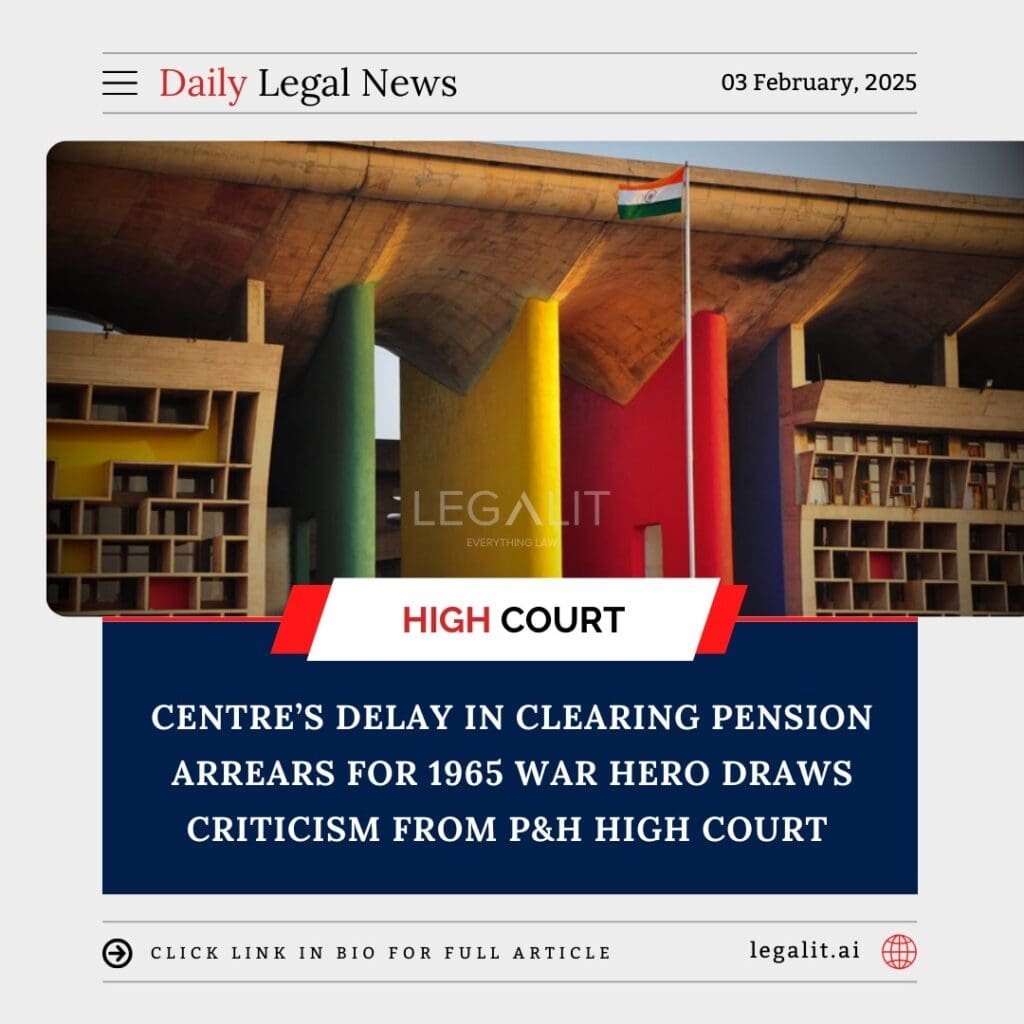
Background
The Punjab and Haryana High Court has expressed serious concerns over the delay in clearing pension arrears for a 1965 war hero. The petitioner, a retired Indian Army officer who served valiantly during the 1965 India-Pakistan war, had approached the court after his long-standing demand for pension arrears was not met by the central government. The veteran had been waiting for these dues for several years, with no clear communication or action from the authorities.
The High Court’s intervention comes at a time when the nation is grappling with growing discontent over the treatment of its military veterans, particularly with regard to pension benefits. Despite the numerous sacrifices made by soldiers during crucial wars, many veterans continue to face bureaucratic hurdles when it comes to receiving their entitled benefits, including pensions and arrears. The court’s decision to scrutinize the matter highlights the importance of timely justice for those who have served the country with honor.
Key Aspects of the Case
- Delay in Payment:
- The petitioner, who fought in the 1965 war, claimed that despite numerous appeals and legal requests, his pension arrears remained unpaid for an extended period.
- The petitioner’s counsel pointed out that the delays not only affected his financial well-being but also highlighted a larger systemic issue regarding the disbursement of pensions to veterans.
- Bureaucratic Hurdles:
- The delay has been attributed to slow bureaucratic processes, with the central government allegedly failing to address the issue despite the veteran’s multiple follow-ups.
- This inaction has prompted the High Court to question the inefficiency within the pension disbursement system, which has led to numerous veterans facing financial hardships.
- Judicial Intervention:
- The Punjab and Haryana High Court has issued notices to the central government, directing them to expedite the clearance of the pension arrears.
- The court also emphasized that the delay in paying pension arrears to veterans undermines their dignity and fails to acknowledge their service to the nation.
The Court’s Rationale
- Moral and Legal Obligation:
- The court stated that the government has a moral and legal obligation to honor the commitments made to veterans, particularly those who have contributed to national security during times of war.
- The payment of pension and arrears is not just a financial transaction but a recognition of the sacrifices made by soldiers in defense of the country.
- Impact on Veterans’ Well-being:
- The prolonged delay in clearing pension dues can cause undue stress to veterans, many of whom are living in modest circumstances and rely heavily on their pension as a primary source of income.
- The court noted that this delay reflects poorly on the country’s treatment of its military personnel, who deserve respect and timely support post-retirement.
- Emphasis on Efficiency:
- The High Court’s strong stance emphasizes the need for greater efficiency in the administration of pension benefits.
- The court has called for systemic reforms to ensure that no veteran is left waiting for their rightful dues, highlighting the importance of streamlining the pension system.
Reactions and Criticism
- Veterans’ Community Support:
- The veterans’ community has widely supported the court’s decision, viewing it as a much-needed step toward securing timely pension payments.
- Various veteran organizations have expressed their frustration over the recurring delays in pension disbursements, often pointing out that such issues are not isolated but affect a significant number of former soldiers.
- Government Response:
- While the government has assured that steps are being taken to clear the pending arrears, no substantial progress has been reported so far.
- Critics argue that the government’s response is inadequate and that more proactive measures are needed to prevent such delays in the future.
- Public Sentiment:
- Public opinion has been largely in favor of the veterans, with many expressing outrage at the delays and urging the government to fulfill its commitments to those who served in the armed forces.
- Social media platforms and various public forums have seen an outpouring of support for the veteran, with citizens calling for the government to take immediate action to clear the dues.
Legal and Administrative Implications
- Accountability:
- The case brings to the forefront the issue of accountability within government systems, especially when it concerns payments and benefits for retired soldiers.
- The court’s scrutiny is expected to push for greater accountability within the pension system and may lead to reforms in how pension arrears are handled.
- Precedent for Future Cases:
- The decision by the Punjab and Haryana High Court could set a precedent for similar cases involving delayed pension payments to other veterans.
- If implemented successfully, the ruling could help ensure that pensioners are treated with the dignity and respect they deserve, leading to faster and more efficient disbursements in the future.
Conclusion
The delay in clearing the pension arrears of a 1965 war hero has exposed significant issues within the pension disbursement system. The intervention of the Punjab and Haryana High Court has brought attention to the plight of veterans, urging the central government to expedite the payment process. While the government has promised to address the issue, the case serves as a reminder of the need for greater efficiency, transparency, and respect for those who have served the nation. Moving forward, it is crucial that systemic changes be made to ensure that no veteran has to endure such delays in receiving their rightful dues.